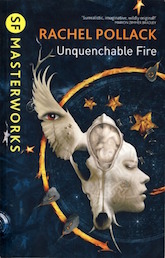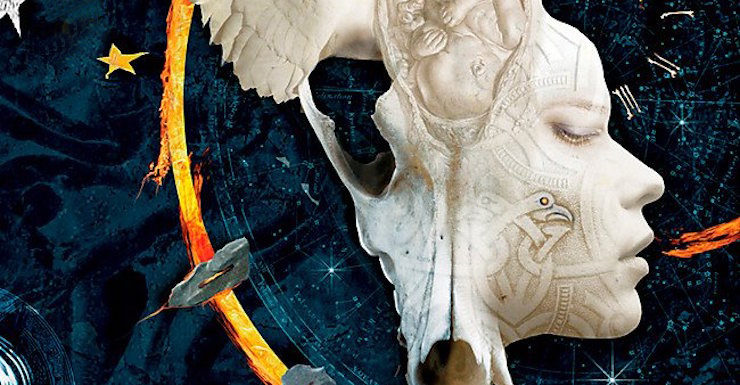Unquenchable Fire is an unconventional contemporary fantasy novel, one that pushes against the limits of narrative and genre. It won the Clarke Award in 1989, it has been reprinted in the prestigious SF Masterworks series, and it is also one of the earliest major speculative novels by a trans woman author.
Rachel Pollack is probably just as well known for her nonfiction as her fiction, if not better; she is a prolific author and lecturer on occult topics, especially the Tarot and other forms of divination. She has had over forty books published, and she is also known as a comic book writer and a visual artist. Pollack is still actively writing; her latest fantasy book The Fissure King came out just last year. Many younger trans writers cite her as an influence, and the recent trans SFF anthology Meanwhile, Elsewhere edited by Cat Fitzpatrick and Casey Plett was dedicated to her.
Unquenchable Fire presents Pollack’s occult influences with such systematicity and thoroughness that it feels almost akin to classic hard science fiction. The novel centers on the life of Jennie Mazdan, all-American suburban housewife, living in a world where magic is not only real, but has increased to flabbergasting levels in the recent past, only to recede again. Jennie makes her living cleaning and maintaining magical guardians for a utility company; she’s recently divorced, and her husband’s left her with the suburban house with the difficult lawn and the nosy neighbors. She could be the classic everyperson—except the divine powers do not will it to be so. She is destined to bear a child who will change the world.
Buy the Book


Unquenchable Fire
The book is not about the child. It is about Jennie, who’s impregnated and—yes—assaulted by the sacred, and who wants to have an abortion and run very far. Parallels with the Virgin Mary are both a given and an oversimplification. Jennie’s path draws upon many other sacred narratives too, including the Buddha’s awakening, and probably many references I missed. The novel incorporates a wide array of spiritual, magical, and occult traditions, from Jewish Kabbalah to the Tarot to the creation stories of many disparate cultures. (Pollack is herself Jewish, but has stated that she was first exposed to Jewish mysticism outside Jewish contexts, when she was studying the Tarot.) There is a meta-level to the book where it becomes a journey of discovery of “oh, that came from there!” But it can also be read as a contemporary suburban fantasy with rich, creative worldbuilding.
I found the book powerful, and its engagement with reproductive justice is refreshing—and not very common in SFF to this day. Jennie is a complex character who is not defined by the mystical assault she experienced. She is surrounded by a cast of characters that both echoes and plays with the tropes of American white suburban literary fiction. She lives in a suburb that could exist in the 1950s or in the ancient era, where people perform arcane rituals to achieve that perfect, weed-free lawn.
Still, Unquenchable Fire is not an easy read. One aspect of that is the length. This is not only a lengthy book, but some of the fictional mythological excerpts and/or dream sequences are typeset in a noticeably smaller font. These are, by and large, the sections that are also more impenetrable to casual readers based on their content, and I found myself feeling that they could have been edited down somewhat, or cut into smaller segments interspersed throughout the book. The novel does have an intricately planned feel, with its 22 chapters relating to—I assume—the Major Arcana of the Tarot, and this is, on one hand, fascinating… on the other, it doesn’t lend itself to an easy pick-up-and-read. You will want to find the time to really sit down with this book, and to sit with it after reading, too.
I also felt that the religious-magical-cultural syncretism of the novel was both an advantage and a difficulty. On one hand, the revelations of innumerable cultures from all over the world are filtered through an American mid-century ambience, amplified to the point where it all becomes satirical. On the other hand, this is precisely the point, and the book is written with a self-awareness of these aspects. I was reminded of the ‘90s onslaught of imported American New Age thought in my country of origin, where after the fall of Communism, a spiritual vacuum was rapidly filled with crystals and knickknacks and coffee divination. The book had a different inspiration, but the result is often similar. Even further, the characters not only struggle with all the magical traditions being true simultaneously, but that they are also less effective. After the massive near-past event in which the Founders arrived in the universe of Unquenchable Fire and let loose breathtaking feats of magic, the present is filled with characters scrabbling to reach at least a glimmer of that glory. Divinatory offices are held in the stunted grip of bureaucracy, and desperate seers resort to substance abuse. Dreams are cataloged by the state. An exhausted Jennie scrubs down idols, sees it all, and understands in a way that very few other people do.
Jennie is also a cis woman who experiences a large spectrum of women’s issues, including reproductive issues and unwanted pregnancy…and all the attendant mysticism, which is commonly weaponized against trans women in New Age and women’s spirituality communities. The spirituality that often becomes trite and gender-essentialist is here presented as powerful, but also not unquestioningly glorified. Many of us fantasy readers imagine a more magical world. Pollack’s novel says that we can get it, and get it regardless of gender—other characters struggle just as much as Jennie, especially her ex-husband. But one of Pollack’s points is that ancient magic will not be twisted into some kind of American Disneyland, despite people’s best efforts. It remains harrowing and threatening and altogether wild, straining at the borders of suburbia; and this is a point seldom made as eloquently as it is here.
Unquenchable Fire has a smaller companion volume, which I am also planning on covering in the near future—but next time, I will discuss a translated novel! QUILTBAG+-related SFF translations before 2010 are very hard to find, and I would love to see this change, with earlier classics newly translated and released in English. In the meanwhile, I do what I can…
Bogi Takács is a Hungarian Jewish agender trans person (e/em/eir/emself or singular they pronouns) currently living in the US with eir family and a congregation of books. Bogi writes, reviews and edits speculative fiction, and is currently a finalist for the Hugo, Lambda and Locus awards. You can find em at Bogi Reads the World, and on Twitter and Patreon as @bogiperson.










